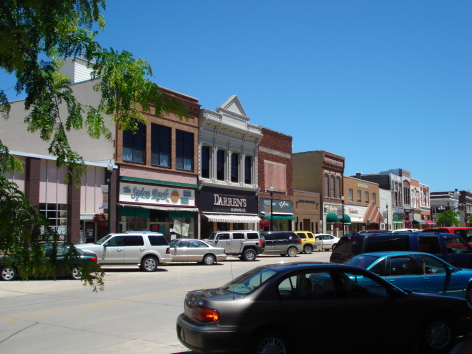AMES, Iowa – Residents in 70 rural Iowa communities will have the opportunity to fill out surveys that will help to inform state and federal officials as they orchestrate the response to the COVID-19 pandemic.
Researchers at Iowa State University and the University of Iowa received a $200,000 rapid response grant from the National Science Foundation to conduct the survey and document the health, socioeconomic and emotional impacts of COVID-19 in Iowa small towns. David Peters, an associate professor of sociology at Iowa State, said the survey data can help to tailor pandemic response in rural communities, where strategies fashioned for urban regions may not be as effective.
“We’re trying to get data as quickly as possible over the next two to three months and get that information to policymakers at all levels of government so they can make decisions to target programs to the specific needs of rural people,” Peters said.
Peters will work with University of Iowa professors Mark Berg in sociology and Nicole Novak in public health. An advisory panel composed of representatives from local governments, public health organizations and other relevant community and business organizations will help guide the project.
The team will survey over 12,000 Iowans from around 70 small towns, covering topics ranging from the availability of health care services to the reliability of high-speed internet to the economic stresses placed on a community by the pandemic. Peters said the survey results will remain completely confidential.
The researchers will select survey participants at random, and selected households will receive a card in the mail by mid-August inviting them to fill out an online survey. Paper surveys will be mailed to those not participating online. In addition, Peters said residents who wish to volunteer for the survey will be able to fill out the online survey as well. Households that don’t want to participate online can request a paper survey.
Peters said the policies enacted to fight the spread of the coronavirus in relatively dense urban areas may not work in rural areas. Those differences make it imperative to gather data to inform policies in rural America, he said. For instance, the survey data will offer insight into whether health care infrastructure and internet access are adequate to withstand the challenges of the pandemic among dispersed populations.
The survey will also examine economic impacts of the pandemic.
“Rent and mortgage assistance in urban areas is important because of the high cost of living,” Peters said. “But that may not be as important in rural areas. We’re hoping to shed some light on what assistance programs will benefit rural areas the most.”
Peters said three of the communities included in the project – Denison, Columbus Junction and Eagle Grove – are home to large animal processing and meatpacking facilities, which have been susceptible to viral outbreaks in recent months. Peters said the researchers will make an effort to encourage the large minority populations in those communities to participate in the survey. The researchers will work with the League of United Latin American Citizens and Solidarity with Food Processing Workers in this effort, and the survey will be translated to a number of languages spoken in those communities, Peters said.
The data gathered in the survey will be compared to longitudinal data gathered since the 1990s through the Iowa Small Towns Project, an ongoing effort to examine quality of life issues in Iowa’s rural communities currently led by Peters.
